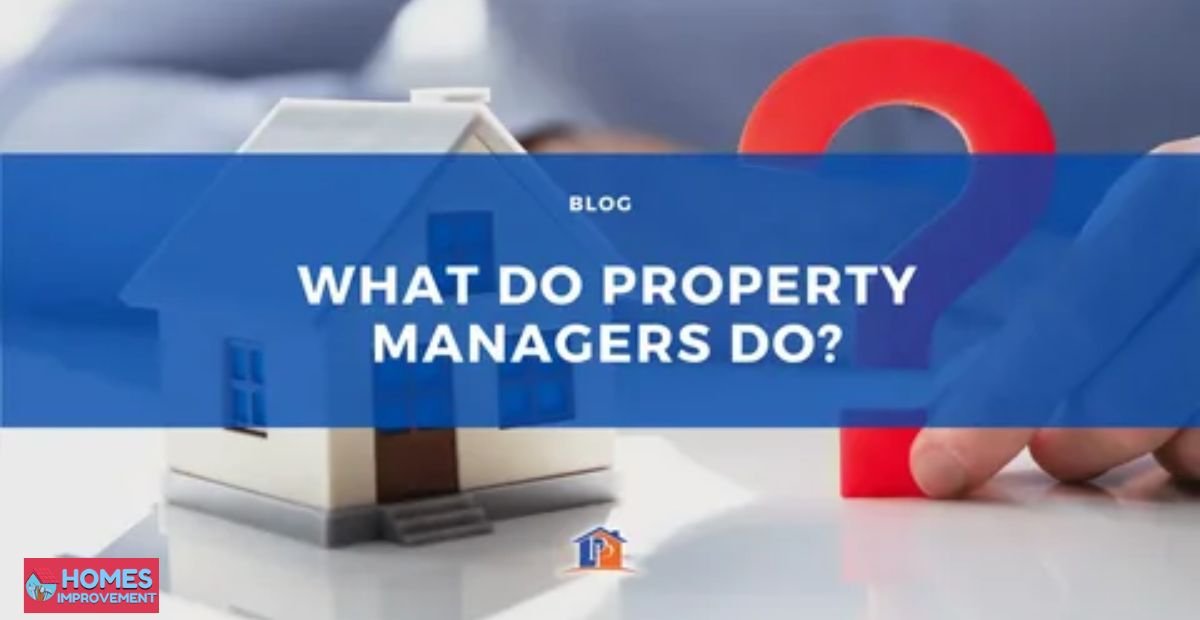What Do Property Managers Do: A Complete Guide for Property Owners

Property ownership can be rewarding, but managing rentals often feels overwhelming. Many landlords ask, what do property managers do and how can they make ownership easier? Property managers handle tasks like finding tenants, collecting rent, maintaining homes, and ensuring legal compliance. Their services save time and reduce stress while keeping properties profitable.
For property owners, having a manager means no late-night repair calls or dealing with difficult tenants. Instead, professionals handle everything smoothly, from marketing rentals to resolving disputes. This complete guide explains the key roles property managers play and why hiring one can transform rental ownership into a hassle-free investment.
Understanding the Role of Property Managers
When you ask what property managers do, the answer is broader than most property owners expect. Property managers serve as the bridge between landlords and tenants. Their duties cover everything from finding reliable renters to handling legal paperwork. They ensure properties remain occupied, tenants are satisfied, and owners enjoy steady rental income without stress. Property managers also handle property marketing, rent collection, and routine inspections. This wide range of services allows owners to focus on investment goals instead of day-to-day tasks. For busy landlords or those living far from their rental homes, hiring a property manager becomes essential. A well-managed property not only attracts quality tenants but also retains them longer. If you’ve ever struggled with vacancies, late rent, or maintenance complaints, then you already understand why their role is so valuable. Property management companies ensure compliance with housing laws and act as a buffer in disputes. Overall, they streamline operations so your rental property runs like a business instead of a headache.
Tenant Screening and Placement Services
Rent collection is one of the most important duties when we discuss what do property managers do. They set up proper rent policies, provide convenient payment methods like online transfers, and make sure tenants pay on time. In cases of delays, managers handle reminders, apply late fees, or take legal action if needed. This professional system ensures landlords do not have to chase tenants for money, and it guarantees a smoother and more reliable cash flow. Their involvement adds structure to the process and reduces stress for property owners.
Besides rent collection, property managers also take charge of the property’s overall financial management. They prepare monthly and yearly reports so owners can clearly see their income, expenses, and profit margins. Budgeting for regular maintenance, emergency repairs, and potential upgrades also falls under their responsibility. By maintaining accurate financial records, they help landlords stay organized and make better investment decisions. This level of financial oversight ensures that the property remains profitable while giving owners peace of mind.
Rent Collection and Financial Management
Rent collection is one of the key answers to what do property managers do. They ensure tenants pay on time by setting clear rules and offering easy payment options such as online portals. If rent is delayed, they handle late fees and take legal steps when needed. Along with this, property managers prepare detailed financial reports, manage budgets for repairs, and keep accounts transparent for landlords. Their role helps property owners enjoy steady income without stress, while also ensuring that the property remains profitable in the long run.
Key Points:
- Set up clear rent payment policies.
- Provide online and flexible payment options.
- Handle late payments and apply legal steps if required.
- Prepare monthly and yearly financial reports.
- Budget for maintenance, emergencies, and upgrades.
Property Maintenance and Repairs
Property maintenance and repairs are a crucial part of what do property managers do. They make sure the property stays safe, functional, and attractive for tenants. From handling routine inspections to coordinating emergency repairs, managers ensure issues are fixed on time. They work with trusted contractors and service providers, often securing better rates for owners. By taking care of everything from small fixes like leaky faucets to larger projects like roof repairs, they protect the long-term value of the property and keep tenants satisfied.
Key Responsibilities
- Conduct routine property inspections.
- Handle emergency repair requests quickly.
- Coordinate with trusted contractors and service providers.
- Manage both minor and major repair work.
- Preserve long-term property value and tenant satisfaction.
Legal Compliance and Documentation
Property managers ensure that all activities follow local, state, and federal housing laws. They handle lease agreements, tenant rights, fair housing regulations, and tax compliance to protect both owners and tenants. By staying updated with changing laws, they reduce legal risks and keep the property operations smooth.
Along with compliance, property managers maintain essential documentation such as rental agreements, inspection reports, and payment records. Proper record-keeping not only helps in audits and disputes but also builds trust between tenants and property owners. This structured approach ensures transparency and long-term security.
Marketing and Reducing Vacancies
If you’re still asking what do property managers do, one of their main tasks is reducing vacancies. An empty property means no income, which can hurt an owner’s finances. Property managers use professional marketing strategies to attract tenants quickly. They create appealing listings with high-quality photos and descriptions. They also advertise on rental platforms, social media, and real estate networks. Managers conduct property showings, answer inquiries, and highlight unique features to potential renters. Reducing vacancy time means owners enjoy steady rental cash flow. Some managers also recommend property upgrades to increase appeal. For instance, fresh paint, new flooring, or landscaping can attract higher-paying tenants. Beyond filling vacancies, managers aim for long-term leases to reduce turnover costs. They also analyze local market trends to set competitive rental prices. By balancing profitability with tenant affordability, managers keep properties occupied. Without professional marketing, many owners struggle to compete in crowded rental markets. Strong marketing strategies are one of the biggest benefits of hiring a property manager.
Communication and Tenant Relations
Effective communication plays a vital role in property management because it ensures smooth interactions between tenants and property owners. Property managers serve as the primary point of contact, handling tenant inquiries, resolving complaints, and sharing important updates in a timely manner. By maintaining open and transparent communication, they help avoid conflicts and foster a positive relationship that builds trust and reliability among all parties involved. Strong communication not only benefits tenants but also ensures that property owners remain informed about their investment.
In addition to communication, property managers work hard to strengthen tenant relations by offering responsive service and addressing issues before they escalate. When tenants feel heard and valued, they are more likely to respect the property and renew their lease agreements. This proactive approach not only increases tenant satisfaction but also reduces turnover rates, creating long-term stability for property owners.
The Benefits of Hiring a Property Manager
Hiring a property manager provides peace of mind to property owners by handling day-to-day operations with professionalism. From finding reliable tenants to managing finances, property managers save time and reduce stress. They also ensure legal compliance, maintain the property in good condition, and maximize rental income. With their expertise, owners can focus on other priorities while knowing their investment is in safe hands.
Key Benefits:
- Efficient tenant screening and placement
- Timely rent collection and financial management
- Regular property maintenance and repairs
- Legal compliance and proper documentation
- Improved tenant satisfaction and retention
- Reduced vacancy periods with better marketing
Conclusion
In conclusion, hiring a property manager is one of the smartest decisions a property owner can make. From handling tenant relations and legal compliance to ensuring timely rent collection and proper maintenance, they simplify every aspect of property ownership. Their expertise not only saves time but also protects owners from costly mistakes. By providing professional management, they help maximize rental income and maintain property value. With a property manager, owners gain peace of mind knowing their investment is in capable hands, ensuring long-term success and stability.
FAQs
Is it worth paying for a property manager?
Yes. A property manager handles marketing, tenants, rent collection, and maintenance, which saves time and reduces stress. Their services often increase rental income and lower vacancy costs.
How much do property managers charge?
Most property managers charge between 8%–12% of monthly rent. Some also charge leasing or setup fees. Costs vary depending on property type, location, and services included.
Can property managers handle evictions?
Yes. Property managers follow local laws to process evictions. They handle paperwork, notices, and legal procedures, protecting landlords from costly mistakes during the eviction process.
Do property managers find tenants?
Absolutely. They market properties, screen applicants, run background checks, and manage leases. Their goal is to place reliable tenants who pay rent consistently and maintain the property.
What are the risks of managing property without a manager?
Without a property manager, landlords risk late rent, poor tenant screening, legal mistakes, and higher vacancy rates. This often leads to more stress and lower long-term profits.





